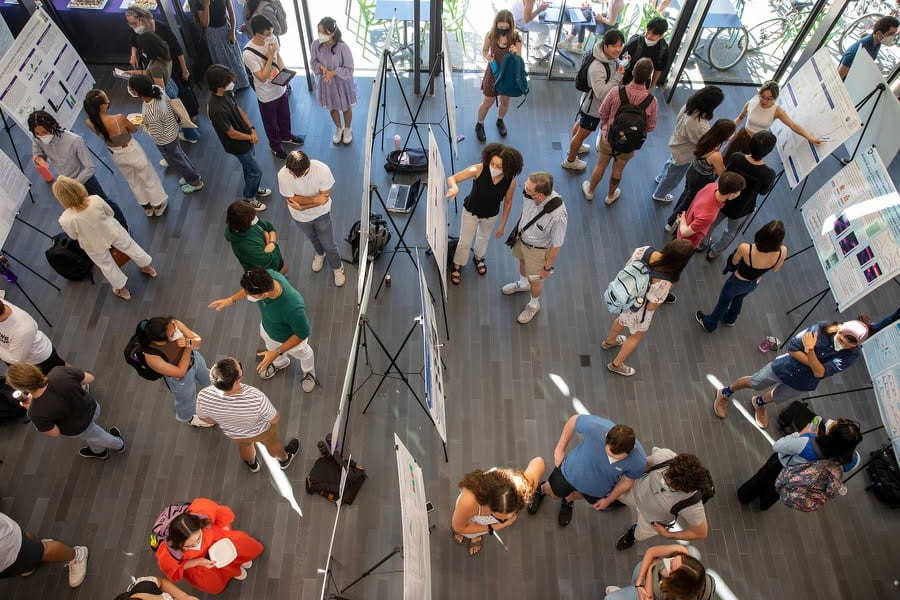Photo by Maria Stenzel
By Olivia Fann
As prospective math majors may have noticed, a certain department was notably absent from 2024 SURF opportunities. This year’s lineup of nine disciplines and 36 total labs participating in Amherst’s Summer Science Undergraduate Research Fellowships (SURF) did not include any members of the math faculty, raising some questions among math students looking for something to do over the summer.
Open only for first and second-year Amherst students with a stated mission to “provide students with their first immersive research experience,” SURF tends to be a top choice for STEM underclassmen. As described by the math department’s Professor Contreras, who has offered SURF in past summers, “SURF is a great opportunity to get immersed in research for the first time, if you are starting your undergrad at Amherst and want to know how it looks to do research. It’s a good gentle introduction to research, not just in math, but in STEM.” Contreras highlights that as an early undergraduate research experience, the main goal of SURF is not to produce a paper, but to learn. For his SURF programs, he works to connect his area of research, broadly being mathematical physics, with topics familiar to first and second-year students. Past students have learned about graph theory and done some coding, with the summer culminating in presentations at Amherst and beyond. His SURF students have presented at national conferences including Joint Math Meetings, the largest math conference in the world.
So why isn’t math SURF being offered this summer? The key factor is faculty availability. Since there is a lot of interest from students and no need to apply for funding, interested faculty are almost always able to run a SURF program. However, according to Contreras, since professors are busy with teaching during the semester, most math faculty “use the summer to make progress in our research. And sometimes the research that we’re working on doesn’t quite translate to an undergraduate project.” Rather than offering SURF this summer, Contreras is using the time to further his research by attending conferences and working on projects with collaborators. More so than some other departments, mathematics often has too steep a learning curve for underclassmen to participate. As Contreras says, “it will take more than one semester, one summer, and usually more than a year to learn all the techniques to make some substantial contribution.”
One alternative to SURF for undergraduate research is a Research Experience for Undergraduates (REU). Unlike SURF, REUs are often external and highly competitive opportunities, where professors apply to receive funds from the National Science Foundation (NSF). As they are open to upperclassmen, REUs tend to be more feasible for faculty to offer. This summer specifically, Professor Amanda Folsom is offering an REU on number theory. Unlike Contreras’ underclassmen-friendly SURF work requiring knowledge in linear algebra and basic proof writing, Folsom’s work on analytic number theory requires exposure to higher-level proofs, specific number theory, and analysis, and is therefore geared towards upperclassmen.
Again, however, whenever research involves undergraduates, there are limitations to what can be accomplished. According to Professor Robert Benedetto, who has offered math REUs in past years, “In math, the undergraduate summer research project is fundamentally a training thing…from the supervisor’s standpoint, it is teaching. From the student’s standpoint, it is learning.” While advanced math majors are capable of more than the underclassmen participating in SURF, they are still far from the cutting edge. As Benedetto says, “if the goal were, ‘let’s get as much research as we can possibly get done’…the step one would be get all the undergraduate students out of the room because they will only slow everything down.” Luckily, that doesn’t have to be the goal. While Benedetto has set aside this summer to focus on research, he currently has a grant proposal in submission to the NSF and may be able to offer an REU in the next couple of years. Benedetto also noted that undergraduate research is not crucial for prospective math grad students, who should prioritize building up their foundation through more advanced coursework.
Nevertheless, Contreras would love to offer SURF again in the future. To him, “SURF is really an experience, and I love the enthusiasm from the students…sometimes there’s this misconception that ‘oh, math is just super hard, I won’t be able to make any contributions because look at all these hard theorems,’ but there are ways in which we can introduce students even at the first or second-year level…I’ve done it three or four times, and every time I do it, I have a blast.”
While it may not be possible to offer every year, it’s clear that undergraduate math research is a fulfilling experience for both students and faculty. With this in mind, first and second-year students should not despair at the lack of 2024 math SURF: there should be exciting opportunities in the future to explore the world of math research.
